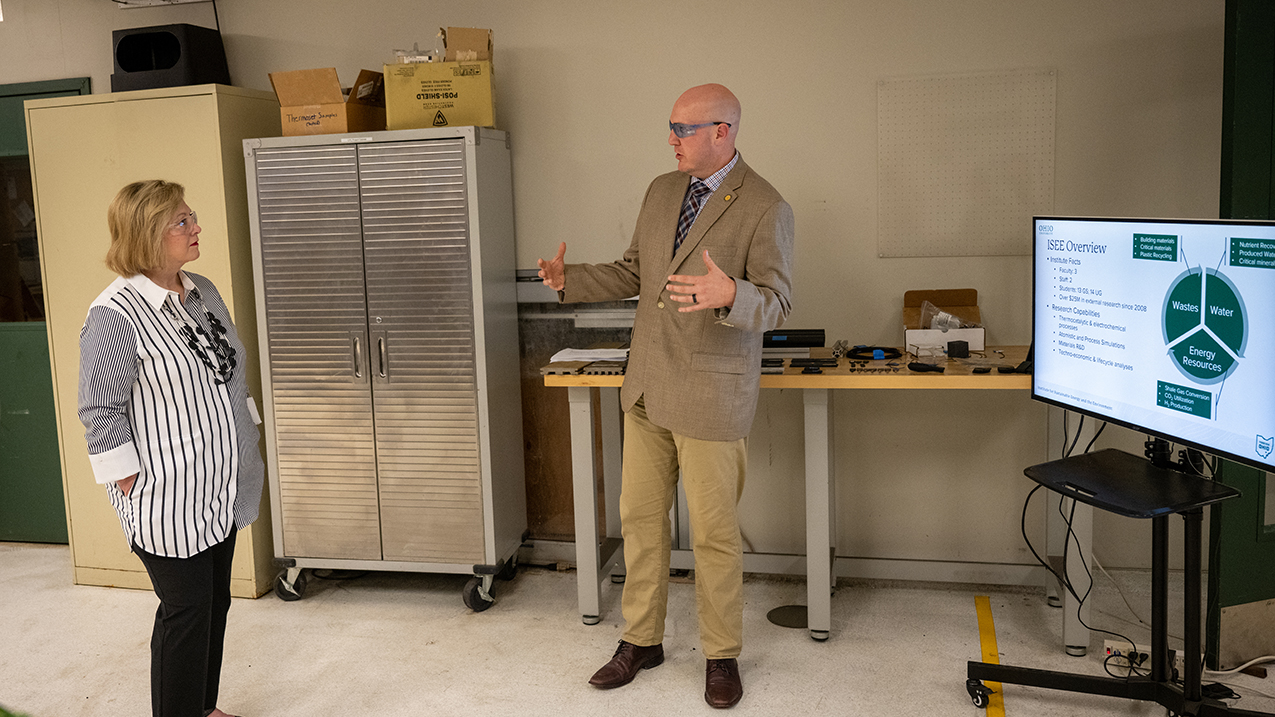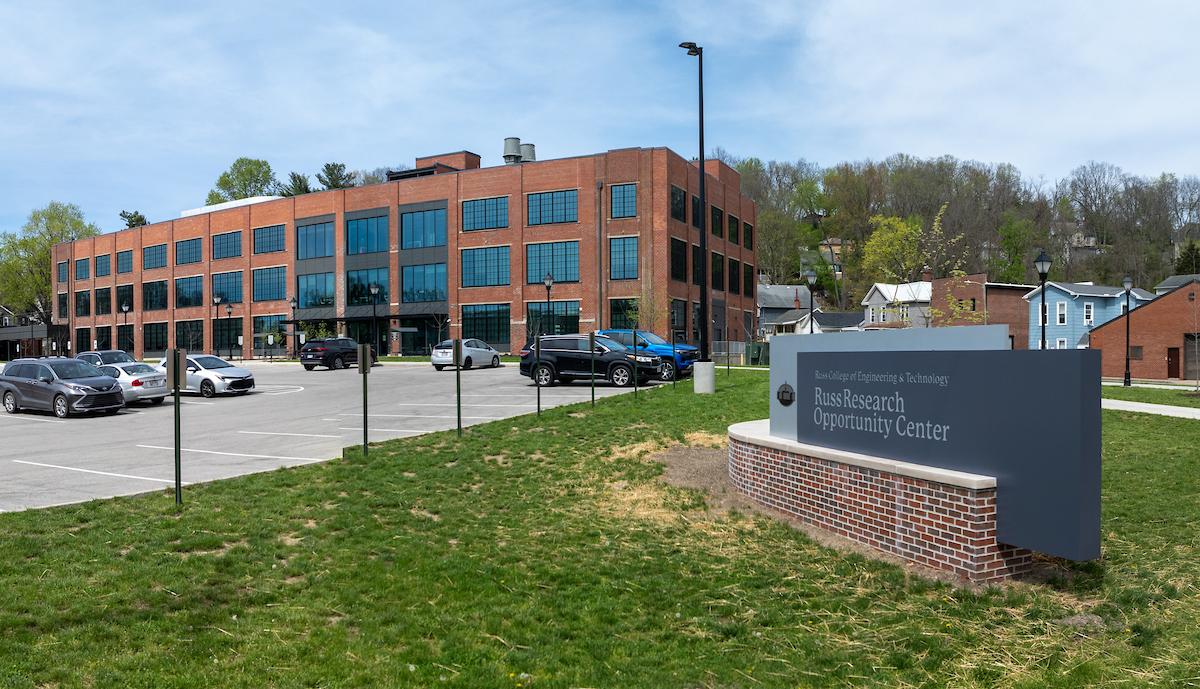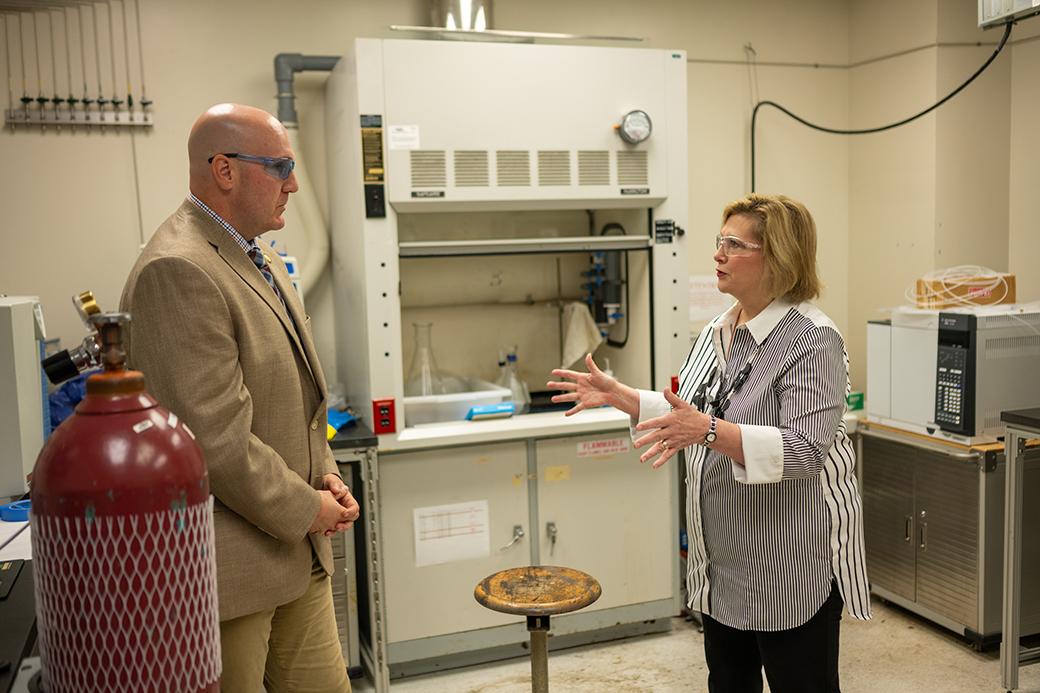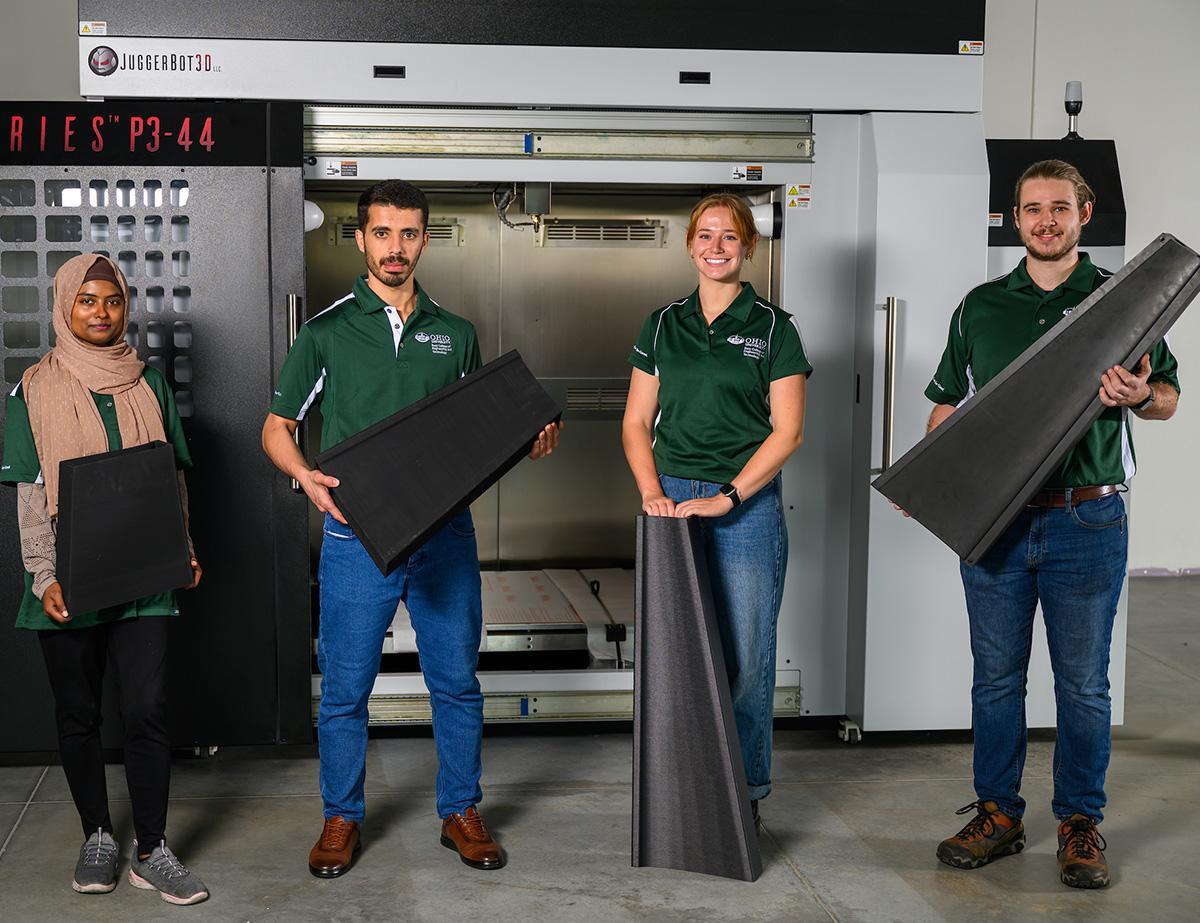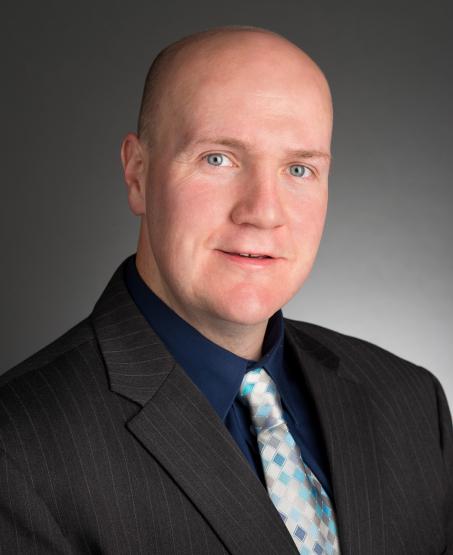
Research bridging these two fields has led to the creation of technologies, infrastructure and practices for the sustainable, and environmentally responsible, manufacturing of materials and production of energy essential to powering the world. This is precisely what Ohio University Russ Endowed Chair and Professor Jason Trembly, Ph.D., has sought to do his entire career.
Jason Trembly receives top recognition for bridging technical innovation and environmental impact
Trembly was recently awarded the 2025 AIChE Lawrence K. Cecil Award in Environmental Chemical Engineering for his efforts in advancing sustainable engineering at OHIO and beyond.
Trembly’s research sits at the intersection of energy, advanced materials and environmental sustainability. As Director of Ohio University’s Institute for Sustainable Energy and the Environment (ISEE), his research spans waste conversion, electrochemical processing, sustainable energy systems and developing carbon-based building materials.

The award focuses on his efforts in advancing sustainable engineering at OHIO and his contributions to national science and policy efforts through his service on the U.S. National Academies Carbon Utilization Infrastructure, Markets, Research and Development Committee.
This award is widely considered to be the top recognition in the field of environmental chemical engineering. According to the AIChE website, the award recognizes an individual's outstanding chemical engineering contribution and achievement in the preservation or improvement of the environment.
“It's humbling to be recognized with such a prestigious award and be selected by my peers whose work I’ve deeply respected for years,” said Trembly. “I’ve never pursued my research with recognition in mind, so it’s a great honor and unexpected, meaningful affirmation of the research my team and I have put into advancing environmental sustainability.”
How ISEE helps OHIO secure nearly $40m in research funding
Through Trembly’s efforts, Ohio University’s ISEE has secured more than $39.8 million in external research funding, fostering a dynamic environment for cutting-edge research and professional development. This funding allows students to hone their skills in state-of-the-art facilities while engaging in innovative projects. Trembly says ISEE is a big part of both his research and ability to collaborate widely at OHIO, with other academic institutions and with industry partners.
“At ISEE we support a diverse set of projects which range from carbon-based building products to electrochemical water treatment to increasing the efficiency of our power distribution grid,” Trembly explained. “I would say one of the keys to our success is the breadth of research, not just my own, but across ISEE as a whole. Through the institute, I’m able to bring together interdisciplinary teams composed of academic and industry partners with diverse skillsets, allowing us to tackle problems from multiple angles.”
One key area of research for Trembly is advancing sustainable carbon materials. Trembly, his students and fellow ISEE researchers are focused on converting carbon waste from mining and other activities into beneficial products including engineered composites, ultra-conductors and carbon allotropes.
- Engineered composites: materials offering exceptional strength, durability, and lightweight properties. ISEE is leading efforts to develop sustainable composites for building and infrastructure applications.
- Ultra-conductors: cutting-edge materials that offer higher conductivity than copper or aluminum, enabling faster power transmission, reduced energy loss and improved performance. ISEE focuses on incorporating trace amounts of engineered carbon into copper and aluminum for ultra-conductive properties with minimal cost increase.
- Carbon allotropes: graphite, graphene and carbon foam utilized in batteries, super-capacitors and fuel cells for their high surface areas, chemical stability and excellent conductivity. ISEE is developing innovative continuous manufacturing techniques which convert renewable resources and legacy mining wastes into high-value carbon allotrope products.
With the Appalachian region’s extensive carbon resources, and mining and industrial legacy, Trembly and his efforts in the carbon materials space also have deep purpose and connection to the region.
Rather than utilizing carbon resources for energy applications, like burning coal, Trembly seeks to repurpose these assets and use them for material sustainability—converting carbon resources into advanced materials that retain their carbon content. Trembly also has discovered methods to repurpose legacy mining impoundments in the Appalachian region and convert their mining waste into viable materials and clean energy.
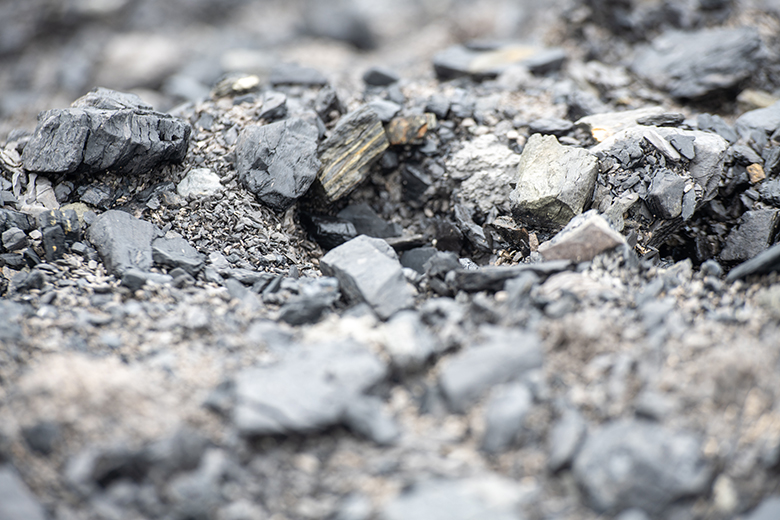
Coal waste sits in a pile in the Appalachian region.

A 3D printed sample of carbon-based material made from coal waste.
“In the past we focused on mining those materials and burning and utilizing them for applications like steel manufacturing and power production. Emissions and early mining practices used in the early 20th century had detrimental, long-standing impacts on the environment,” emphasized Trembly. “Rather than having to mine new resources, we can take existing wastes and repurpose them for positive and good use for our society and economy.”
Outside of sustainable carbon materials, Trembly’s work also delves into environmental remediation efforts such as produced water remediation and electrochemical nutrient recovery, as well as sustainable energy systems—reimagining energy waste to reduce emissions and produce value-added products that provide greater supply chain reliability.
“It’s not just about creating lab results,” said Trembly. “It’s about turning those results into real-world technologies that can meaningfully advance industrial sustainability.”
Educating the next generation of sustainable engineers
Connecting engineering to sustainability started very early in Trembly’s career as an Ohio University undergraduate student. During an internship with American Electric Power (AEP), he was able to work at different power plants within its system. This hands-on experience sparked Trembly’s enthusiasm for the connection between energy and environmental systems and the importance of sustainably produced energy to society and the economy.
“That mindset I developed early on continues to drive my research today,” Trembly explained. “Over time, it became clear that sustainable practices had to be built into our large industrial systems.”
Trembly went on to have what he refers to as an unconventional graduate pathway. While working on his master’s research, he received a fellowship from the U.S. Department of Energy to pursue doctoral work at the National Energy Technology Laboratory. He says this experience transformed his career and research trajectory and further shaped his approach to problem-solving in energy and environmental areas.
As someone who holds three degrees from Ohio University, Trembly knows the possibilities students can unlock through education. After leading research in the industry, Trembly returned to his alma mater with the goal of creating a research program that offered OHIO students the same ability that he had early in his career to help create and develop solutions to some of the most pressing energy and environmental challenges.
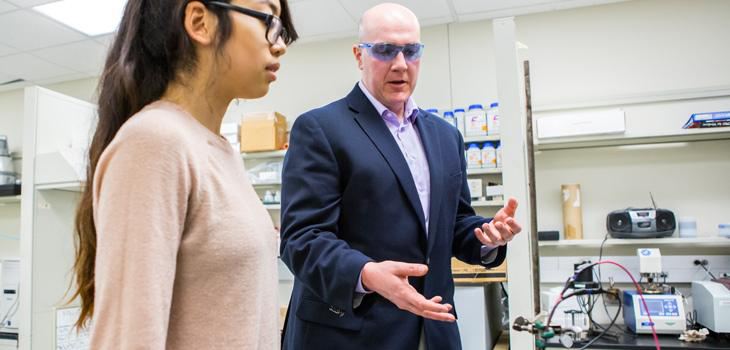
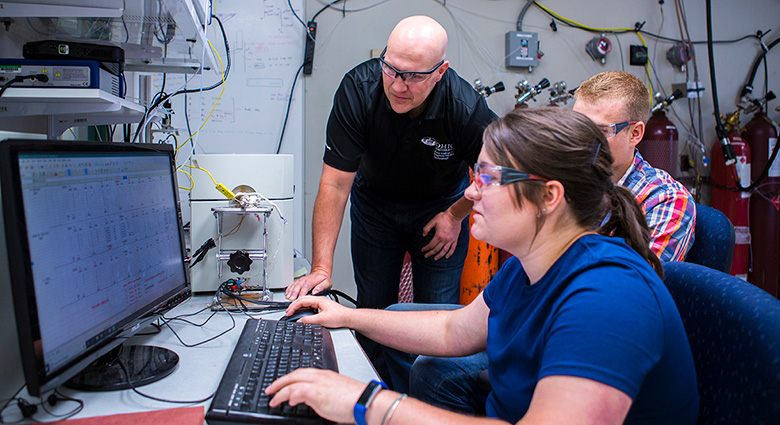
“Mentoring and providing opportunities for our students to grow is something that I care deeply about, and it’s one the core reasons I came back to Ohio University,” emphasized Trembly. “A major goal of mine has been to build not just the physical lab and research space, but also a strong culture of mentorship—so students can have the kind of hands-on, transformative experience I had at the national lab, right here on our campus.”
Under Dr. Trembly’s direction, ISEE has extended its national leadership into new research areas, granting students even more pathways to connect engineering and sustainability. Students and faculty conduct most research in the Russ Research Opportunity Center, an on-campus, 14,000 square-foot research and development facility.
“Helping students connect their technical education to global challenges is one of my key responsibilities. One of the most rewarding parts of my job is seeing students make that connection and then launch their own ideas, developing solutions of their own.” said Trembly. “Students bring energy and new perspectives and I learn just as much from them as they do from me.”

